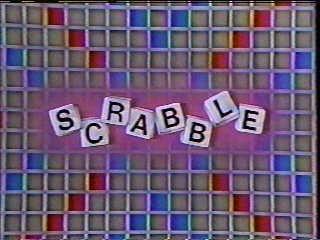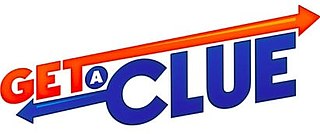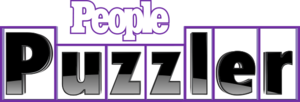Related Research Articles

Scrabble is an American television game show based upon the Scrabble board game. Muriel Green of Exposure Unlimited developed the idea for a television game show based upon the board game concept. During 1983, Green convinced Selchow and Righter, who at that time owned the Scrabble board game, to license Exposure Unlimited to produce the game show. Exposure Unlimited co-produced the show with Reg Grundy Productions, and licensed the show to NBC. Scrabble aired on NBC from July 2, 1984, to March 23, 1990, and again from January 18 to June 11, 1993. Chuck Woolery hosted the program. Jay Stewart was the announcer for the first year. Charlie Tuna replaced him in the summer of 1985 and remained through the original run and the entirety of the 1993 revival.

Lingo is an American television game show with multiple international adaptations. In it, contestants compete to decode five-letter words given the first letter, similarly to Jotto, with each correctly guessed word earning number draws to attempt filling in a Bingo card.

Now You See It is an American television game show created by Frank Wayne for Mark Goodson-Bill Todman Productions. The object of Now You See It is to answer general knowledge trivia questions by finding the answers hidden in a grid, similar to a word search puzzle.

Chain Reaction is an American television game show created by Bob Stewart, in which players compete to form chains composed of two-word phrases.

The Cross-Wits is an American syndicated game show which premiered on December 15, 1975, and lasted for five seasons until its cancellation on September 12, 1980. The show was hosted by Jack Clark, with Jerri Fiala as hostess. Announcing duties were handled by John Harlan, Jay Stewart, and Jerry Bishop. The show was produced by Ralph Edwards Productions and distributed by Metromedia Producers Corporation.
Chain Letters was a British television game show produced by Tyne Tees and Barry & Enright Productions. The show was recorded at their City Road studios in Newcastle Upon Tyne and first broadcast on ITV in the United Kingdom from 7 September 1987 to 6 July 1990, then again from 2 January 1995 to 25 April 1997.
A*mazing is an Australian children's television game show that aired between 16 May 1994 until 1998 on the Seven Network. It was famous for a relatively large and elaborate maze/obstacle course that was part of the show's studio set. A*mazing was hosted by James Sherry for the entire run of the series. A*mazing was produced at Channel 7 in Brisbane from 1994–1996 and then at Channel 7 in Perth from 1997–1998.

Blackout is an American game show that was broadcast on CBS as part of its daytime schedule from January 4, 1988 until April 1, 1988. The program was created and produced by Jay Wolpert. The game features two contestants, each paired with a celebrity. Contestants attempt to solve word puzzles consisting of a sentence or short paragraph with four blank spaces. Players guess each missing word based on hearing clues recorded by their partner, but with the playback being muted or "blacked out" at certain places by their opponent.
PDQ and Baffle are American television game shows created by Heatter-Quigley Productions. Both shows' objective was for contestant/celebrity teams to guess a given word or phrase in the shortest amount of time with the fewest letters given as possible.
Camouflage is a television game show that aired on Game Show Network. Hosted by Roger Lodge, and billed as "the hidden word game where the answer is always right in front of you", Camouflage originally aired for 40 episodes from July 2 to 27, 2007. The show is a word game, with contestants searching for a hidden word or phrase in a string of jumbled letters. The show is produced by Enjoy the Ride Productions in association with McB Entertainment.
Lingo is a British game show based on the American programme of the same name, the original iteration of the programme was made by Thames Television and Action Time for ITV, running for a single series with host Martin Daniels from 12 May to 14 July 1988. A revived version has also aired from 1 January 2021 hosted by Adil Ray.
Wordplay is a game show presented by Jenny Powell and sometimes Jenni Falconer. It aired live weekdays from 23 March to 31 July 2009 on Channel 5 and was axed after only one series.

Lingo is a television game show that aired in the Netherlands between 1989 and 2014, and returned in 2019 on the commercial channel SBS6. Since 2022, it is aired on the commercial channel Net5. The format consists of a word game that combines Mastermind and Bingo.
Pyramid is an Australian children's quiz show screening on the Nine Network from 2009-2015 hosted by Shura Taft. It is co-produced by Sony Pictures Television and produced by Sydney-based Ambience Entertainment. It began broadcasting on 1 September 2009 and is filmed in front of a live studio audience. It involves two teams competing in games of "vocal charades". The show is based on the 1979 United States game show The Junior Partner Pyramid, a children's variant of the Sony Pictures Television Pyramid franchise.
Family Game Night is an American television game show based on Hasbro's family of board games and EA's video game franchise of the same name. The show was hosted by Todd Newton. Burton Richardson was the announcer for the first two seasons; he was replaced by Stacey J. Aswad in the third season, and Andrew Kishino was hired for the fourth season. The 60-minute program debuted on October 10, 2010, on The Hub ; it was previewed on October 9, 2010, on its sister channel, TLC. Seasons 1 and 2 contained 26 and 30 episodes respectively. Seasons 3, 4 and 5 each contained 15 episodes. Season 2 premiered on Friday, September 2, 2011, with additional games being added. The games added to the second season included Cranium Brain Breaks, Green Scream, Ratuki Go-Round, Simon Flash, Operation Sam Dunk, Trouble Pop Quiz, and Spelling Bee. However games from the previous season were still kept.
Letters and Numbers was an Australian game show on SBS. It is hosted by former newsreader Richard Morecroft, co-hosted by David Astle and Lily Serna. Although it is based on the French game show Des chiffres et des lettres, its structure is similar to the UK version of the show, Countdown - with the titular difference being used to avoid confusion with the Australian music program Countdown.

Scrabble Showdown is an American game show created for the American cable network The Hub. The program was based on the board game Scrabble and was hosted by Justin Willman. It ran from September 3, 2011, to April 15, 2012.

Get a Clue is an American television game show hosted by Rob Belushi that aired on Game Show Network from January 6, 2020 to April 16, 2021.

People Puzzler is an American television game show hosted by Leah Remini and broadcast by Game Show Network. It premiered on January 18, 2021. The show is inspired by the celebrity and pop-culture themed crosswords in People magazine.

Tug of Words is an American television game show that premiered on Game Show Network on November 8, 2021.
References
- ↑ "Spit It Out TV listings". Seven Network. Archived from the original on 21 November 2010. Retrieved 4 October 2010.
- ↑ "Network Seven Advance Guides" (DOC). TV Tonight . Archived from the original on 10 April 2016. Retrieved 4 October 2010– via Seven Network.
- ↑ Pascoe, Matthew D. (8 October 2010). "Review: Spit It Out". TV for kids. WordPress.com. Archived from the original on 28 October 2010. Retrieved 8 October 2010.
- ↑ Conroy, John (22 May 2008). "Game helps people Spit It Out" . The Border Mail . Archived from the original on 6 March 2012. Retrieved 4 October 2010.
- ↑ Miller, Glenda (29 September 2010). "Channel Seven – Spit it Out TV Show" (PDF). Kennington Primary School. Retrieved 4 October 2010.[ permanent dead link ]